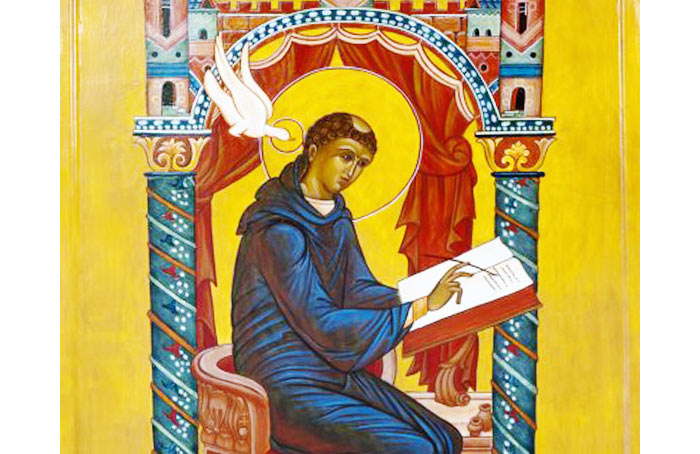Commentary on the Letter of Jude 20 – 25
20 – 21 But you, dearly beloved, build yourselves up on your most holy faith, pray in the Holy Spirit, keep yourselves in the love of God.
We pray in the Holy Spirit when pierced by divine inspiration we request help from on high to receive the good things which we are unable [to acquire] of ourselves. Blessed Jude, therefore, advises us so to build ourselves up on the foundation of our holy faith, so to join ourselves as living stones to the house of God which is the Church, so to keep ourselves in the love of God, that we may never presume on our own strength but may hope in the help of divine protection, lest anyone, according to the teaching of Pelagius, declare that he can be saved on his own, but all may request the coming of the Holy Spirit to us, that inspired by him we may be able to pray more earnestly, lest we perhaps be separated from the company of the holy Church with those who do not have the Spirit and therefore persist in being physical.
22 – 23 And censure some, indeed, who are judged, but save others, snatching them from the fire, have mercy on others with fear.
What he says, with fear, must be joined to all three that he had mentioned, because when anyone censures those who are apostates and shows that they are worthy of condemnation, he ought to act with fear, lest perhaps something of this sort happen to him or those close to him whom he loves, and also anyone who chastises another and snatches him from the fire of his vices ought to look to himself, for fear he himself may also be tempted (Galatians 6:1), and anyone who has mercy on a neighbor who repents ought of necessity to act in his case, circumspectly too, lest he be perhaps either severe or devoted more than is just.
23 Hating even that stained garment which is fleshly.
He calls our body our fleshly garment. We ought not, however, to hate our body but we ought to hate it in every way it is stained and see to it, as far as we are able, that we render it stainless, so that from being fleshly it may deserve to be made spiritual. Because this must be accomplished not by the power of our free will but by the grace of God, there is properly added:
24 But to him who is able to keep you without sin and establish you stainless in rejoicing before the sight of his glory.
He does well to say that we whom he previously advised to serve God with fear are to be established in rejoicing before the sight of his glory, because the more anxious we are about our actions in the present, the more joyful shall we be in the future about the reward we have received.
25 To the only God our saviour through Jesus Christ be glory, splendor, lordship and power before all ages both now and for ever. Amen.
This summary bestows coequal and coeternal glory and the kingdom both on the Father and Son through all and before all ages and refutes the error of those who believe that the Son is less or later than the Father, when it says that glory, splendor, lordship, and power belong to God the Father through Jesus Christ our Lord, and this not from some beginning in time but before all ages both now and for ever. Amen.
This commentary is excerpt from The Commentary on the Seven Catholic Epistles of Bede the Venerable, translated by David Hurst, O.S.B., Monk of Portsmouth Abbey in Portsmouth, Rhode Island USA, and published by Cistercian Publications, Kalamazoo, Michigan USA (1985) and A.R. Mowbray & Co Ltd, Oxford, UK.
Top image credit: Icon of St. Bede (cropped), painted by Sr. Jeana Visel, OSB, image source.
Bede, also known as Bede the Venerable, (673-735 AD) was born near St. Peter and St. Paul monastery at Wearmouth-Jarrow, England. He was sent there when he was three and educated by Abbots Benedict Biscop and Ceolfrid. He became a monk at the monastery, was ordained when thirty, and except for a few brief visits elsewhere, spent all of his life in the monastery, devoting himself to the study of Scripture and to teaching and writing. He is considered one of the most learned men of his time and a major influence on English literature. His writings are a veritable summary of the learning of his time and include commentaries on the Pentateuch and various other books of the Bible, theological and scientific treatises, historical works, and biographies. [bio source]




His words are just beautiful after the horror of the first verses of warning and a special message from God for our age